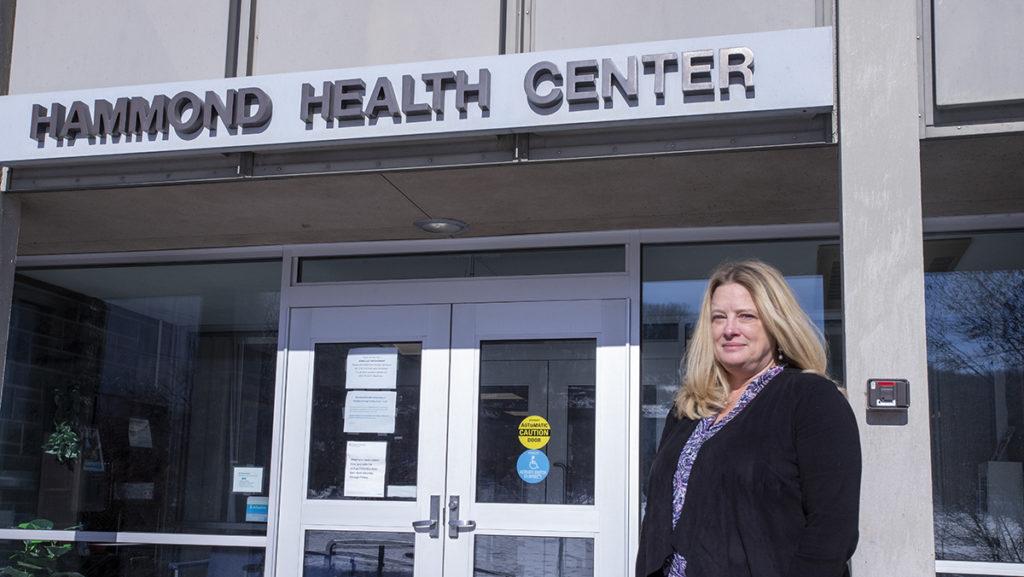Jennifer Metzgar has been appointed as the new director for Student Health Services at Ithaca College and is taking the place of Ellyn Selin-Sellers, former director for Student Health Services. Metzgar graduated from SUNY Health Science Center in Syracuse, New York in 1999 and has worked in primary care ever since. She came to Ithaca College 10 years ago and has been working with students as a nurse practitioner at the Hammond Health Center.
Staff writer Caroline Grass spoke with Metzgar about her experience in health services and what she hopes to bring to her new position.
This interview has been edited for length and clarity.
CG: Where are you from and can you tell me about how you started your career?
JM: Yeah, so I’m actually local. I was raised in a very small town called McGraw, which is probably 30 miles from here. I started my career in medicine really at the age of 15. I worked in a nursing home as a nurse’s aide, that’s kind of how this all started.
CG: What inspires you or who were some of your biggest influences in the health field?
JM: I’ve always been fortunate to have great mentors along the way. From instructors that I’ve worked with to special colleagues that I’ve worked with, it’s really been a lot of nice personal experiences … I worked with Dr. Vivian Lorenzo. She and I worked together at the VA [Veterans Administration], that’s 12 years ago now. And she kept saying, “Do you have any interest in college health?” And I’m like, … “I’ll think about it.” So this went on for years and then I finally did come on over to college health and I’m so thankful that she brought me.
CG: How does college health differ from other health fields?
JM: The unique thing about college health is that I really just take so much satisfaction in working with young adults. It’s a different age group and often sometimes it’s simple, sometimes people just want to come in and have their sore throat treated, … but other times there’s opportunities to help students learn about their bodies, learn about the medical system, learn and gain confidence around seeking medical care for the first time maybe without their parents being involved. I also have empathy towards parents who maybe their child may be at school and encountering health or illness problems all on their own for the first time. So I really love kind of filling that gap between the student and the parents to help facilitate some of that … I think it’s really a neat opportunity to teach, … and the thing that I really love about students is … They want to learn how to navigate their own illness, they want to learn about their body.
CG: Do you have main goals to continue to improve or expand services available to students?
JM: Yeah, I would love to explore some creative ways to deliver service, some thinking outside the box. In the past, I did pioneer an STI [sexually transmitted infections] express clinic for students. But that’s an example of just how we can have more care for more people with less kind of bureaucracy around medicine. Right now we’re unable to run a clinic because of COVID and its social distancing restrictions, but that’s an example of ways that I’d like to think about providing care.
CG: For the director position, did the college come to you with the offer or was the opening something you saw and felt like you really wanted to step into this position?
JM: So a little bit of both. It really began as a conversation. Having spent my entire life being immersed in medicine, I began to see areas that systems could help make the work easier for both the staff and for the student or for the patient. So I have really been focused and have a keen eye toward some of those process type things, like how do we have an office visit that’s sufficient for the students so that you’re not waiting an hour in the waiting room? … So that’s kind of how this came to be … I think just one other thing I wanted to share with you about myself and why this has been a good fit for me career wise, I have a very science-focused mind so there’s enough intellectual stimulation in medicine, but I’m also a caretaker. I’m very empathetic, I have a knack for connecting with people. So I think for me medicine has been kind of that perfect marriage of science and heart.








